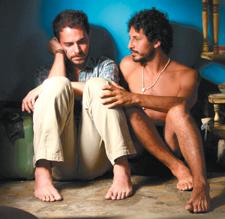Undertow (Contracorriente), the Centrepiece Gala presentation at this year’s Inside Out Toronto LGBT Film and Video Festival, is a classic story of forbidden love, sexual awakening, grief and human frailty.
Set in a Peruvian fishing village, gorgeous, married and soon-to-be father Miguel (Cristian Mercado) meets gorgeous, tortured and soon-to-be dead painter Santiago (Manolo Cardona). The two fall passionately in love, sneaking away regularly to enjoy each other’s bodies and souls, safe from the prying eyes of a community disapproving of man-to-man love.
Santiago drowns tragically, caught in an undertow, but returns to Miguel’s life almost immediately, seemingly as alive as you and I, but visible to no one except Miguel. Santiago can’t rest, he tells his love, until his body is found and ritually returned to the ocean. As Miguel searches, their love grows ever deeper until the village gossip reveals their corporeal relationship to all, including Miguel’s pregnant wife.
“It’s incredibly beautiful; I don’t even know how to explain it,” Inside Out programming director Jason St-Laurent told me of Undertow.
His point: it’s very difficult to do justice to the quality of this film by describing it. In synopsis, the story reads cheesy: a same-sex romance between a man and his dead boyfriend, a love quadrangle among a man, a woman, a newborn and a ghost. Forbidden love, coming out and wrestling with sexual repression are ubiquitous story forms in gay cinema. These are all technically accurate descriptions of Undertow, but on screen this film is superb.
It is visually stunning. The writing is sophisticated and elegant. Each character interaction, each plot instrument, adds meaningful weight. The character development and acting is outstanding. Of special note is Mariela (Tatiana Astengo), Miguel’s wife.
“I wanted to make sure that the wife was not just an obstacle in the love story between the two men,” says writer-director Javier Fuentes-León. “I wanted her story to be just as important.”
Fuentes-León captures skillfully the teeming complexity of human emotion — the suffering — as societal expectations of sexual morality grind up against the realities of human nature. He understands and communicates beautifully the perils of hiding our true selves, living dishonestly and repressing our natural sexual and romantic urges.
“I don’t even think they think about ‘I’m gay,’” he says. “That’s part of the conflict that Miguel has. He’s just in love with this man — and with his wife and child — and he doesn’t see himself as a gay person. He probably never will; the label is not that important.”
Undertow is Fuentes-León’s first feature film, and it earned the Dramatic World Cinema Audience Award at Sundance in January. I asked him about his experience getting his first feature — a Spanish-language, Latin American, Brokeback, ghost-story romance — from imagination to the festival circuit.
Peruvian-born and living in Los Angeles, Fuentes-León started writing the script in 2001 as he was coming to terms with his own identity as a gay man. He tried without success to secure funding from US sources before being invited to the 2005 Berlin International Film Festival. That’s where he met his German co-producers and when things started to come together for Undertow. The film was shot in Peru, included a Columbian film star (Cardona) and was post-produced in Europe (sound in France, picture in Germany). Parts of the financing came from each of those countries.
“That’s the story for pretty much every Latin American film,” says Fuentes-León. “In the whole process of finding the financing, the gay issue was not brought up that much. It’s just hard to make a film…. But I wrote it for me and for everybody who has lived something like this, and I think we all have: coming out. I wrote it with us in mind but I wanted it to be for everybody.”

 Why you can trust Xtra
Why you can trust Xtra


